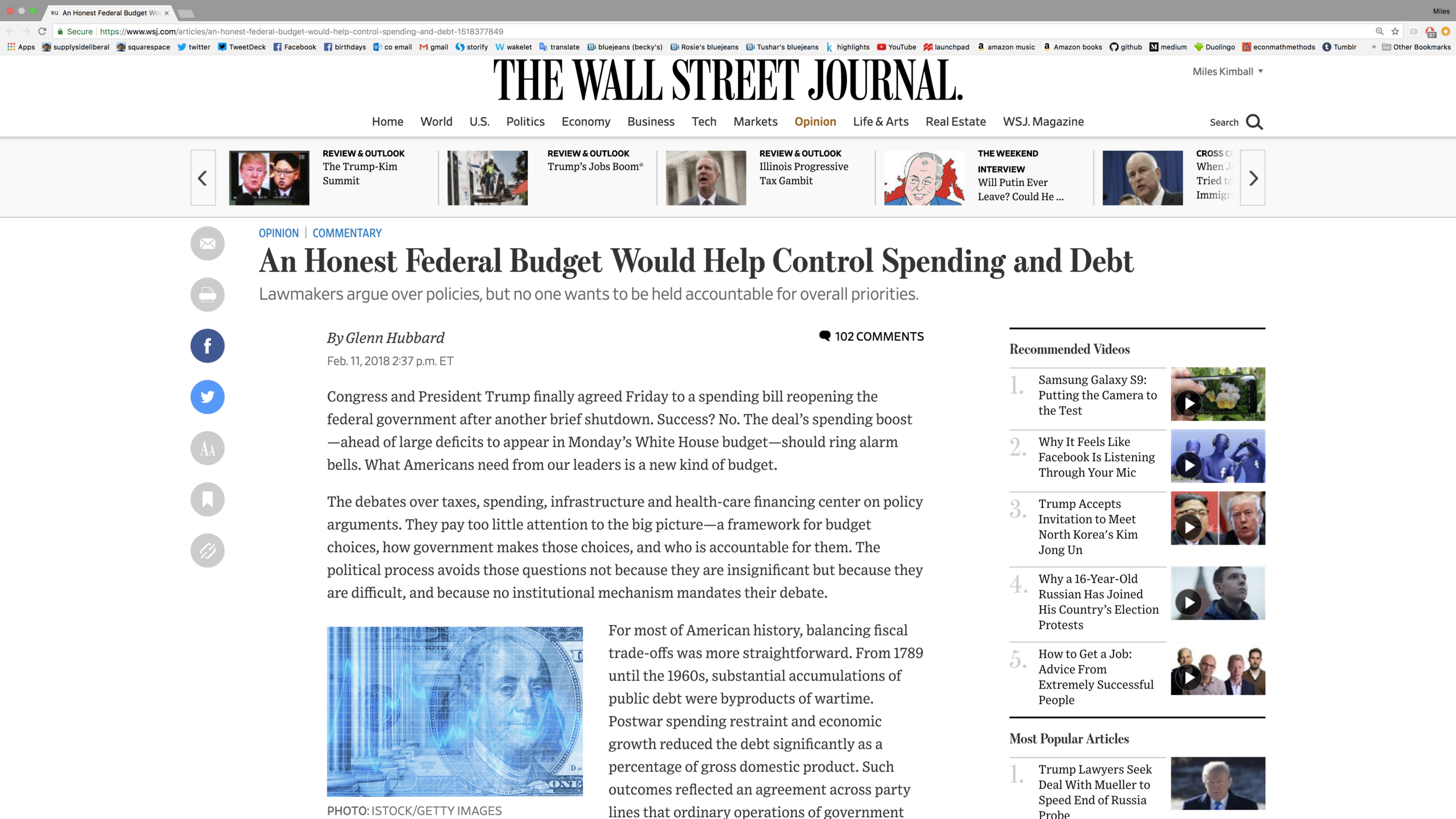Glenn Hubbard on National Debt Ethics
In Glenn Hubbard's February 11, 2018 Wall Street Journal op-ed "An Honest Federal Budget Would Help Control Spending and Debt," I like his principle that that there should be a presumption against having a future generation pay for benefits current generations get. Here is how he lays this idea out:
The ratio of federal debt held by the public to GDP has skyrocketed, from 26% in 1970 to 75% in 2017. Our present-day arguments over tax burdens notwithstanding, this shift reflects changes in spending. And spending has shifted away from traditional public goods toward private benefits in the form of transfer payments like Social Security and Medicare, while no mechanism forces tax changes to fund current and projected spending.
This observation is not meant to suggest simply that “spending is too high.” Rather, the issue is one of accountability for spending choices. Historically, spending on war or territorial expansion was conceptualized as “capital” spending—benefiting current and future generations, who shared the costs. Regular operations were borne by the people alive at the time. Such an approach does not necessarily mean lower spending, but it does require current taxpayers, not future ones, to pick up the bill.
While trying at many points in the op-ed to be even-handed between those who want more spending and those who want tax cuts, one of Glenn's specific proposals reflects his own desire to restrain spending:
The Hoover Institution’s Tim Kane and I have offered one idea—that each year’s total federal spending be limited to the average annual inflation-adjusted revenue of the previous seven years. This formulation attenuates problems posed by inflation and the business cycle. Temporary spending increases could be approved by legislative supermajority votes, with increasing supermajorities required for longer departures from the rule. Such departures would be up to the Congress at the time, as opposed to predefined categories.
Because the seven-year average inflation-adjusted revenue is predetermined and slowly changing, such a rule would make it very hard to increase spending. Compare Glenn Hubbard and Tim Kane's proposed rule to this one:
Estimated natural-level-of-employment tax revenue must equal at least the average inflation-adjusted spending of the previous seven years.
The second rule would push toward tax-hikes instead of spending restraint. Neither Glenn Hubbard and Tim Kane's proposed rule, or the rule just above (which as far as I know, noone is proposing) is neutral between spending restraint and tax hikes. A rule that would be more neutral is this one:
Absent an official declaration of war or a supermajority vote, what each year's total federal spending would be if the law was applied to a natural-level-of-employment situation must be no more than 3 % higher than the average inflation-adjusted—and previous-15-year-average-real-GDP-growth adjusted—revenue of the previous seven years; also estimated natural-level-of-employment tax revenue must be no more than 3% lower than the average inflation-adjusted—and previous-15-year real GDP-growth-adjusted—spending of the previous seven years.
In practice, this rule would require quite a bit of both spending restraint and tax hikes to reduce the government budget deficit, while allowing some adjustment in taxes and spending over time after the budget is roughly in balance.
One of my earliest blog posts makes another attempt at a balanced budget rule:
Let me caution that any balanced-budget rule would be safer when coupled with eliminating the zero lower bound, so that the Fed can stabilize the economy effectively, even in the absence of specifically legislated fiscal stimulus. See my aggregator post "How and Why to Eliminate the Zero Lower Bound: A Reader’s Guide." Among the posts flagged there, these discuss fiscal policy as well as monetary policy:
- Negative Rates and the Fiscal Theory of the Price Level
- Monetary vs. Fiscal Policy: Expansionary Monetary Policy Does Not Raise the Budget Deficit
- How and Why to Avoid Mixing Monetary Policy and Fiscal Policy
- Helicopter Drops of Money are Not the Answer
Finally, on the idea of capital budgeting that Glenn touches on, see my column with Noah Smith
and my post
Update: I noticed a related March 15, 2018 Brookings post: "Three reasons to be optimistic about budget process reform" by Stuart M Butler and Timothy Higashi.
